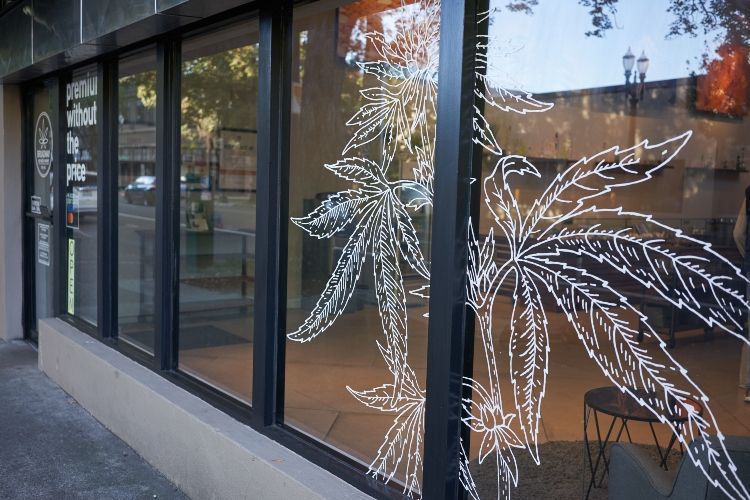Finding the Right Real Estate for Your Cannabis Business

The cannabis industry can seem like a labyrinth, ranging from intricate regulatory requirements to banking obstacles, and more.
However, a lesser-known, yet significant hurdle in this arena, is the complex component of cannabis
real estate. Discovering the most suitable property for your cannabis business is very important, as countless aspects should be taken into account and may include considerations that many entrepreneurs might not think of initially. Consider some insights needed to navigate the cannabis industry’s real estate landscape.
The first challenge is identifying what type of property best suits your cannabis business. The industry is diverse, it’s composed of various segments like dispensaries, cultivation operations, processing units, transportation services, and manufacturing operations, each with unique real estate requirements.
Your choice of property should align with your operational needs, whether it's a retail storefront, a spacious warehouse for cultivation, or a manufacturing facility. On top of being a functional structure, your property must also comply with the applicable local and state building codes,
regulatory compliance, and zoning regulations.
Working with a knowledgeable realtor and qualified inspectors during this process is highly recommended. You may find the perfect location, but if $700,000 worth of HVAC renovations are required to meet the code, you may reconsider your selection.
Choosing the Right Cannabis Real Estate for Your Business
Your choice between owning and leasing, and the type of property you decide to acquire, largely depends on your operational plans.
Cultivation: Indoor, Outdoor & Greenhouse Cannabis Operations
Cultivating cannabis, much like any other agricultural endeavor, demands a thorough understanding of the plant's requirements and the specifics of the cultivation site. Whether the cultivation occurs indoors or outdoors, the fundamental principles stay the same and are largely akin to the requirements for other crops, such as tomatoes or flowers.
A few key elements must be considered when
considering an indoor cultivation facility
property—first, the availability of adequate lighting systems. The light cycle plays a significant role in the life of a cannabis plant, generally requiring around 18 hours of direct light and 6 hours of darkness during the growth phase. This ratio typically shifts to 12:12 to stimulate bud production. As such, the chosen property must support high-wattage lighting systems capable of mimicking the intensity and spectrum of natural sunlight.
Another overlooked aspect of an indoor facility is an ample water line. This ensures you can effectively implement your chosen cultivation technique. Coupled with this, you'll need adequate space for the plants and climate control capabilities for airflow regulation. Good airflow is essential in preventing the growth of mold caused by excessive humidity, a common challenge in indoor cultivation. Proper assessment of the HVAC system is critical; while this component is sometimes overlooked, it must be adequately assessed when considering a
property for cannabis cultivation.
Moreover, enough space should be allocated to keep different types of cannabis, or cultivars, separated to prevent unwanted cross-pollination. This consideration is essential to maintain individual strains’ unique properties and quality.
When it comes to
outdoor cultivation or greenhouses, the considerations shift slightly. Although you can leverage natural sunlight and save on electricity costs, these environments are more exposed to pests and extreme weather events. It's vital to consider the local climate, the quality of the soil, the quality of the existing (or future) greenhouse infrastructure, and the availability of resources like water when evaluating an outdoor cultivation property.
In some regions, properties are equipped with all necessary cultivation facilities—often called
turnkey solutions.
However, one must ensure the property complies with zoning regulations for cannabis production and meets all local requirements before proceeding with such an option.
Manufacturing
Cannabis manufacturing facilities are a critical component of the industry and involve a variety of operations – such as the extraction of cannabinoids from raw materials, the preparation of infused edibles, and the production of various other cannabis products.
Due to the complexity and risk associated with these processes, finding the right property to house a cannabis manufacturing unit requires careful consideration of numerous factors.
A critical requirement for manufacturing units, especially those involved in extraction processes, is adherence to the
Class One Division One (C1D1) standards. These
standards are part of the
National Electrical Code (NEC), designed to ensure safety in areas where flammable gases or vapors are in sufficient quantities to represent a hazard. Given the volatile nature of
substances often used in cannabis extraction, such as butane or ethanol, it is vital that your facility can meet these stringent standards to ensure safe operation and compliance with regulations.
The selected property should ideally have sufficient space to install the necessary safety and extraction equipment. It must provide:
- adequate ventilation
- explosion-proof electrical systems
- the ability to isolate the extraction area from other operations to prevent any possible accidents
Furthermore, due to the
often-hazardous nature of the substances involved, the facility must be equipped with robust safety measures like fire suppression systems, emergency exits, and spill containment solutions.
When manufacturing edibles or other food-grade cannabis products, the property should also meet food safety regulations. This includes having a design that supports proper sanitation, pest control, and waste management, among other things.
Given the substantial investment in setting up a manufacturing unit, including the cost of specialized equipment and any necessary modifications for safety and compliance, it can often be more beneficial to purchase a property than lease one. Ownership allows for greater control over the modifications required and eliminates the risk of lease termination due to the nature of the operations. Additionally, owning the property can add value to the business and
offer a significant ROI.
Lastly, the location of the manufacturing unit is another essential consideration. It should ideally be near cultivation sites for easy plant material access and near distribution centers to ensure quick and efficient transportation of the finished products.
Retail Locations
When hunting a retail property for your cannabis business plans, the location is paramount. Ideal retail properties should command foot traffic and be easily visible and accessible from the road.
A relatable non-cannabis example of a prime retail location is Chick-fil-a. These restaurants are almost always built in the same shopping complex as Lowes and Home Depot because the sandwich chain recognizes the proximity to the hardware stores will create a high-traffic area with ample parking. Your foremost challenge for a retail business is making your presence known to potential customers and creating an enjoyable shopping experience for repeated business.
Remember that competition for desirable retail properties can be fierce due to limitations created by zoning regulations. As a retail business owner, another factor is the cost of building your space or renovating the location. You’ll want to consider the new build/renovation timeline and how that may affect your speed to market.
Sometimes, the cannabis retail stores that open first will retain market share after new locations open just because the clientele are already familiar with their establishment and may be apprehensive about going somewhere else unfamiliar.
Just think about going to the grocery store across town where you don’t know where anything is located; even if it is more convenient to shop there if you’re traveling through, many of us will drive to the grocery store we are familiar with instead of testing the unknown. From a consumer experience standpoint, it’s the same for cannabis retailers.
Cannabis Distribution Centers
Choosing cannabis real estate for distribution centers in the industry requires a unique approach. The nature of the business necessitates properties that can accommodate secure storage and manage complex logistics. A critical factor in this decision-making process is accessibility.
The chosen location should facilitate smooth inbound and outbound logistics to ensure products are moved efficiently. Properties with easy access to major highways and proximity to customers or cultivation/manufacturing facilities may also prove advantageous for distribution centers.
The overall security of the property should also be taken into consideration; sometimes, these locations are located in more industrial areas, and you want to ensure the safety of your employees and contractors is assured daily.
Testing Facilities
Finding the ideal property for cannabis testing facilities presents its unique challenges. These operations must comply with Good Laboratory Practices (GLP), a set of guidelines to ensure the integrity of the test data and the safety of laboratory staff. GLP compliance heavily influences the selection of property for testing facilities.
The chosen property must provide adequate space for laboratory equipment and workspaces that allow for precise, controlled conditions. This means considering factors such as:
- Ventilation
- temperature control
- isolation of different testing areas to prevent cross-contamination
Furthermore, the location of testing facilities is crucial in ensuring timely service to cultivation sites, manufacturing units, and dispensaries. Proximity to these businesses can reduce the time taken for product testing, thus ensuring a faster time-to-market for cannabis products.
Cannabis testing
facilities and laboratories
must also have measures to safely store and handle cannabis products and potentially hazardous testing reagents. Therefore, the property should either be equipped with these safety measures or allow for necessary safety upgrades.
Should I Buy or Lease Cannabis Real Estate?
Another early decision in your cannabis business plan is whether to buy or lease a real estate property. Both options have their own sets of advantages and potential drawbacks.
The Ownership Advantage
Cannabis property purchasing can amplify your business's worth, facilitate a more tailored approach to your operations, and even lead to a substantial return on investment (ROI).
The value of your property could further increase if you secure a license for the operations housed at your facility. However, owning a property is not without its perils. If the
market plummets, property ownership could transform into a financial burden. While real estate is rarely unsellable, especially those with constructed facilities, you're left vulnerable to a fluctuating market.
Leasing as a Viable Option
Often, fledgling businesses need more capital to buy a property outright. In such cases, leasing a cannabis real estate property emerges as a viable alternative. Leasing offers a lower financial risk and provides flexibility, especially if you need to exit the business quickly. This strategy could be particularly effective if you're venturing into a high-risk industry segment or operating in a community with shifting perspectives on cannabis and its legality.
Leasing a property for a cannabis business comes with its own set of challenges. Securing insurance can be challenging, especially in markets that aren't entirely receptive to cannabis. A crucial consideration if you're contemplating leasing, is the extent of flexibility in your business vision. You may need to
adjust your business model
to accommodate the type of operation allowed at the facility and the type of facility available.
Plan Your Cannabis Real Estate From Day One
Discovering an aesthetically pleasing property where you envision your cannabis business thriving is just the first step. You must also secure your financial and energetic investment by ensuring your property can accommodate your future business growth.
This means considering features such as the:
- square footage
- ceiling height
- security measures,
- air flow
- insulation
- and more for cultivation facilities
If you're planning a manufacturing operation, ensure the electrical capacity can handle your business at maximum output.
Whether you’re starting out or looking to expand an operation, working with a trusted business partner or an
experienced consulting company with a strong track record in securing cannabis properties is highly recommended.
A knowledgeable partner can guide you in securing capital, submitting applications, winning licenses, developing systems and operating procedures, and creating a thriving working environment. They can also connect you with the right team members and associates to give your operation a leading edge in this competitive industry.
Make Informed Decisions with 3C Consulting
By understanding the nuances and complexities associated with this market, you can make informed decisions that could significantly contribute to the long-term success of your business.
Whether you're a budding entrepreneur or an established business owner looking to expand, remember that the road to success starts with the right piece of real estate.
Contact us
for your cannabis
due diligence before entering the industry’s real estate market.
Recommended Articles
C O N N E C T W I T H U S
C O M P A N Y
R E S O U R C E S
S E R V I C E S
©2024 3C Consulting, LLC™. All Rights Reserved. Terms of Use | Privacy Policy



